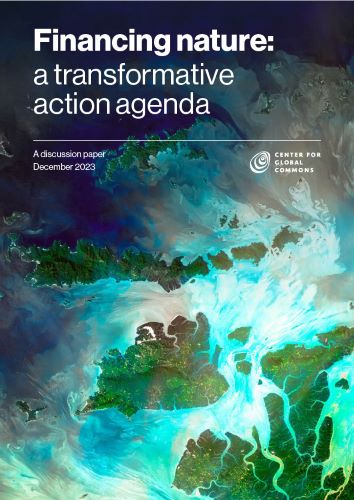There is no life without nature, and no functioning economy either. But the current economic and financial system fails to adequately account for and value nature’s services, leading to nature breakdown. A systemic approach is needed to make nature-positive investable and put nature at the centre of public and private decision-making.
‘Nature breakdown’
We are experiencing ‘nature breakdown’, says a report launched at COP28 today.
In unequivocal language, its authors – led by Naoko Ishii of the Center for Global Commons at the University of Tokyo – catalogue the problems pushing Earth’s natural systems beyond their boundaries.
This is because our economic systems fail to adequately value nature. The conservation, restoration and sustainable use of nature are chronically underfunded, while harmful subsidies – estimated at US$530 billion – receive close to four times more financing than nature-positive investments.
Over 80% of global nature finance flows originate from and are directed to advanced economies; they fail to reach those emerging markets and developing economies that are highly vulnerable to nature loss, but also hold the majority of the world’s natural capital. And only 17% of nature finance is private capital – even though the report estimates the business opportunities across nature at around $10 trillion globally.
Barriers to investing in nature are even higher than in clean energy and low-carbon transport. This is because the metrics of financing nature are inherently complex, harmonised approaches to measuring and valuing nature have yet to be mainstreamed, and nature-positive projects face a higher risk perception from investors. Moreover, environmental crime persists due to lack of integrated regulation and enforcement mechanisms.
Yet nature drives human wellbeing, and is our greatest ally in achieving climate and development targets.
Turning the tide
The good news is that political momentum, financial innovation and technological solutions are converging to turn the tide on nature loss. The report points to a number of positive signs, citing the clear policy targets set out in the Global Biodiversity Framework, larger volumes of financial instruments, such as debt conversions for nature and blended finance vehicles, and greater uptake in voluntary initiatives and corporate commitments. It also highlights the role of a “revolution in nature data”, which is expanding our ability to measure, track and account for nature.
These solutions now need to be mainstreamed.
Urgent systemic action can transform nature finance
Rebuilding our economy’s relationship with nature will require coordinated public and private sector action across five action areas, to deliver on the Global Biodiversity Framework, Paris Agreement, and Sustainable Development Goals. The report calls on leaders to support an ambitious agenda, to be developed in the next two years, before COP30 in Belém, Brazil.
The additional need for finance is estimated at around $400 billion a year, but it will also be essential to re-orient existing capital away from harmful activities. Nature finance should drive more capital “into” nature – its conservation and restoration – but also “for” nature, shifting agriculture, fisheries, forestry, mining, infrastructure towards nature-positive outcomes. The report calls on a “whole of economy approach” that addresses cross-sector drivers of nature loss.


